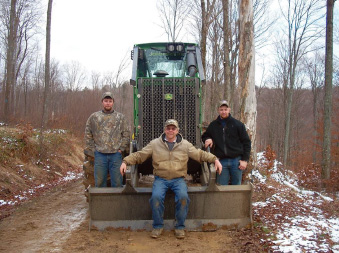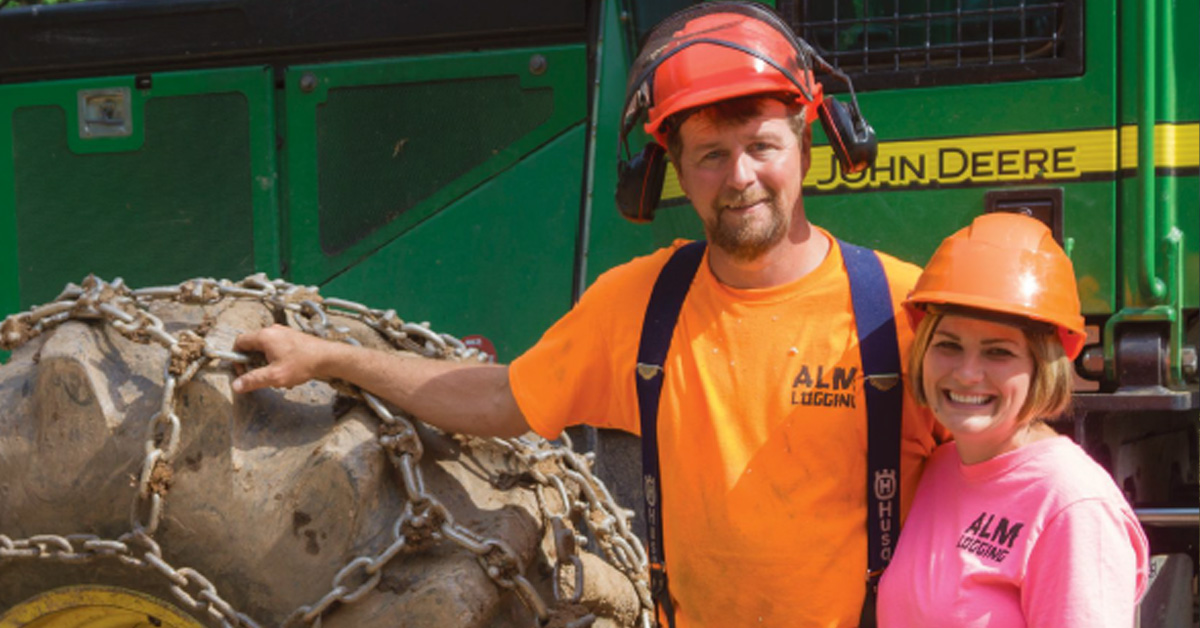Committed to the Woods
When Your
heart is in it
By Eileen Townsend
For Neal Graham of ALM Logging in northern Pennsylvania, seven days a week used to be a regular workweek. Like many loggers, Graham felt that in or-der to make ends meet and keep afloat in a tough business, he couldn’t take time off. Said Graham, “There were no weekends; there was nothing. I used to work until dark. I loved it, but you miss your kids growing up. You miss all this stuff. Now I have a couple grandkids, and I’m hoping I can slow down and spend some time with them.”
For Graham, who lost both his father and his brother in woods accidents in recent years, and who himself suffered a bad back injury last year while working in the woods, the job has not been easy. But in his 25 years logging, Graham never once thought about doing something else. “My heart is in it,” said Graham. “Your heart has to be in it to do this work.”
The Graham family name comes up a lot when you talk about logging in northern Pennsylvania. Neal Graham is a third generation logger. His grandfather, Jim Graham, who passed away in the mid-1990s, got his start logging in the 1950s. Neal’s grandfather started in the industry because Jim’s brother, Llewelyn F. Butler, ran a birch still in Morris, Pennsylvania. Birch stills – used for distilling flavorings out of birch bark – were once popular in the region but are now obsolete. “He had one of the last operating stills in the area,” said Neal. “My dad and my grandfather and my two uncles all worked for him until he retired. Then they went their separate ways. Each bought a piece of equipment and contracted to sawmills.”

Neal Graham always knew that he wanted to follow in his family’s footsteps and work in the woods. “I’ve been around it ever since I was a kid. I’d go to work with my dad on the weekends and then when I was off in the summertime, I got to sit on his lap and drive the skidder. I started working right out of high school,” said Graham. “I actually skipped school days so I could come to work. That’s all I ever wanted to do and I have done it ever since. It was tough getting started, trying to learn everything and how to do it.”
When The Northern Logger visited Neal Graham on the job this past summer, he was busy cutting ash logs and pulpwood on a 220 acre timber sale near Morris, PA. Samantha, Neal’s wife of 16 years, worked alongside him. Said Graham, “When I get in a tough spot and get some long skidding she comes and helps.” The couple met at Sam’s parent’s restaurant, where Sam worked for many years. They now have three daughters, Ashley, Lacey, and Mackenzi. The first initials of the girls names combined inspired the name “ALM.”
Sam doesn’t mind working in the woods. “I like it,” she said. “It’s different than flipping burgers; that’s for sure. It was a big time learning curve, but I put all my trust in him to teach me what to do. You never stop learning.” As for the harvesting aspect of the job, she’d rather stay away from it. “I don’t touch a chainsaw,” said Samantha. “That’s all him.”
Neal is grateful for her help: “I thank Samantha for sticking with me,” he said. “It takes a special woman to be a logger’s wife.”
Hard Work and Hard Challenges
Graham cuts with a Stihl chainsaw and runs a 2013 John Deere grapple skidder and an older John Deere cable skidder. Said Graham, “Both the cable and the grapple have their advantages. The grapple is easier on your body because you don’t have to get off and unhook the trees as much, but you can’t get in a lot of places to get the trees. The majority of this job has been done with the cable but we’re also bunching them with the grapple.
A skidder and hand-felling setup is common in the Pennsylvania woods where the Graham family has always lived and worked. The area boasts steep terrain that makes mechanical harvests difficult. In addition, many state timber sales don’t allow mechanical felling for conservation reasons. And for small contractors like Graham, even if the terrain and government were friendlier to mechanical setups, it would be difficult to stay on top of the hefty payments.
But hand-felling, especially in recent years, is a dangerous business. Northern Pennsylvania has been hit particularly hard by invasive pests in the past decade. The pests devastated the health of the forest and have created innumerable hazards for loggers.
“The scariest thing is all these dead trees in the woods,” said Graham. “In the next few years around here it’s going to get terrible with this ash borer, with all these dead trees. I’m scratching my head in terms of, ‘What are we going to do? Do you get in the skidder and drive around and see if you can push them over so they don’t end up falling on your head?’”
“If it wasn’t for my dad, I wouldn’t know anything about the woods. My dad pretty much taught me everything. He’d been in it his whole life, so he knew the ups and downs."
The situation is not improving. “It’s progressed over the last several years,” said Graham. “The bugs are killing everything. They say the lanternfly is here. These trees here don’t appear to have the beetle in them yet. But the other area I was cutting in, around Liberty, PA, that was loaded with the beetles in the trees. In Mansfield, too. You can really see it in this area now as you’re driving around.”
The Graham family knows the worst effects of these hazards. After the accidental deaths in the woods of Neal’s father, Roger, and Neal’s brother, Andy, it was difficult for Neal to keep going. Then an accident last fall broke Neal’s neck and back and put him out of work for several months. He and Sam are still picking up the pieces.
“If it wasn’t for my dad, I wouldn’t know anything about the woods,” reflected Neal. “My dad pretty much taught me everything. He’d been in it his whole life, so he knew the ups and downs. He taught me not to hurry. I don’t come out here with a goal every day of trying to cut a load or two loads or three loads. If I get a half a load, I’m happy. If I get three loads I’m happy. I don’t have a goal when I come here every day. You get done what you get done. He always instilled that: Don’t rush, just be steady. Make every step count and be safe. That’s the best advice you can give everybody, I think: Make every step count out here. I’ve changed a lot.”
Part of what keeps Graham going is that he feels close to his grandfather, dad, and brother when he’s working in the woods. “I’d only been working three years in the woods and my grandfather passed away. And it has just been a rollercoaster since, with my dad and my brother. Not a day goes by that I don’t think about them. That’s what drives me to get out here and go to work every day. That’s where they’re at.”
“We work safe,” Graham emphasized. “We’re responsible loggers. But it’s very dangerous.”
Graham has two high-school-aged nephews who are eager to start logging. But having been through what he has been through, Graham has reservations. “Their heart wants them to be here but I don’t know if I want that. It’s a hard call for me to tell them no, because it’s a great way to make a living. If you’re out here by yourself in this every day, you know, you love it. I love it. The people who are here in this industry all love it. You have to. But it’s not an easy time to get into logging.
“With my nephews, it’s a hard call. I’m not gonna put them with a saw in their hand for a long time. I would never ever put anybody under a tree. I’d love to have somebody cut for me but I don’t want the responsibility of anyone standing under a tree doing that. ”
As for their own safety, Neal and Sam take a lot of precautions. They always keep phones on them and check in every hour. But they know that working every day is essentially a matter of faith. Said Neal, “You just gotta study the tree for a long time and hope you make the right call. There’s pressure on everything.”
Looking Forward
In recent years, the majority of Graham’s business has been driven by ash cuts and cleanup from blow downs. This past summer, Graham said the market had been good. “They don’t slow me down so the logs are moving good,” said Graham. “It’s just the pulpwood market is hard around here. There’s not very many places to take it and it gets plugged up pretty quick. There’s times when you just have to cut it and leave it. It’s a shame because a lot of these cuts, you know, with the first thinnings you go through to open it up and get the understory coming, and then they go back and cut the other trees. It’s so hard to get back through if there’s poles laying on the ground.”
Blowdowns, meanwhile, have provided a source not only of revenue but some peace of mind from a safety perspective. Said Graham, “I didn’t see many storms like this when I was a kid, growing up. But now it seems that you get one or two of them a year. With some of these things, you kind of hope for that. With these ash trees, you hope for if the wind would just blow for a week and knock them over.”
When The Northern Logger followed up with Graham this fall, he said that business had gotten tougher due to the very wet weather. “Stuff has been going very slow in recent months,” said Graham. “The weather has been absolutely horrible. It’s the wettest year I’ve seen in the woods for 25 years. Production isn’t even a word anymore. It’s just a couple load a week, if that. Couple days a week. It rains and then it gives a day or two in between and then in rains again. When it rains it just rains inches, it don’t rain a quarter inch anymore. It’s measured in inches.”
But despite the weather, yet another hurdle in a tough business, the Grahams said they were in good spirits, having just welcomed a new grandchild into the world. On the phone Neal sounded happy. He said he was looking forward to spending time with his family. ♦

